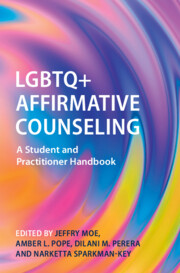Book contents
- LGBTQ+ Affirmative Counseling
- LGBTQ+ Affirmative Counseling
- Copyright page
- Contents
- Figure
- Tables
- Box
- Contributors
- Part I Foundations of LGBTQ+ Affirmative Counseling
- Part II LGBTQ+ Lifespan Development and Family Dynamics
- Part III Assessment and Treatment in LGBTQ+ Affirmative Counseling
- 10 Assessment, Diagnosis, and Treatment Planning for LGBTQ+ Individuals
- 11 Evidence-Based Practice for LGBTQ+ People
- 12 Crisis and Trauma-Informed Care with LGBTQ+ Populations
- 13 Substance Use Disorder Treatment and Recovery with LGBTQ+ Populations
- Part IV New Directions in LGBTQ+ Affirmative Counseling
- Index
- References
11 - Evidence-Based Practice for LGBTQ+ People
from Part III - Assessment and Treatment in LGBTQ+ Affirmative Counseling
Published online by Cambridge University Press: 31 October 2024
- LGBTQ+ Affirmative Counseling
- LGBTQ+ Affirmative Counseling
- Copyright page
- Contents
- Figure
- Tables
- Box
- Contributors
- Part I Foundations of LGBTQ+ Affirmative Counseling
- Part II LGBTQ+ Lifespan Development and Family Dynamics
- Part III Assessment and Treatment in LGBTQ+ Affirmative Counseling
- 10 Assessment, Diagnosis, and Treatment Planning for LGBTQ+ Individuals
- 11 Evidence-Based Practice for LGBTQ+ People
- 12 Crisis and Trauma-Informed Care with LGBTQ+ Populations
- 13 Substance Use Disorder Treatment and Recovery with LGBTQ+ Populations
- Part IV New Directions in LGBTQ+ Affirmative Counseling
- Index
- References
Summary
This chapter reviews the role of evidence-based practice (EBP) when providing clinical services to LGBTQ+ youth and adults. Evidence-based practice integrates three domains: the best available research evidence, clinical judgment, and patient characteristics, values, and contexts. Each of these domains is discussed in detail in the chapter. The chapter proceeds to review the adaptation of EBPs to be LGBTQ+ affirmative and cognitive behavioral therapy, acceptance and commitment therapy, and mindfulness-based cognitive therapy as effective evidence-based interventions for mental and behavioral health concerns with LGBTQ+ individuals. Additionally, the chapter provides evidence-informed considerations for addressing self-acceptance, self-esteem, and career-related concerns in counseling for LGBTQ+ individuals. Evidence for group modalities with LGBTQ+ individuals is also provided. Lastly, the chapter provides a resource table outlining how to best integrate affirmative care and EBP when working with LGBTQ+ individuals, along with a clinical case study.
Keywords
- Type
- Chapter
- Information
- LGBTQ+ Affirmative CounselingA Student and Practitioner Handbook, pp. 197 - 215Publisher: Cambridge University PressPrint publication year: 2024

